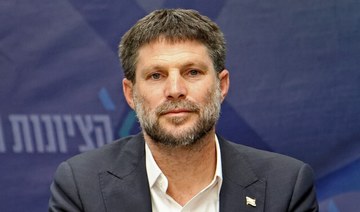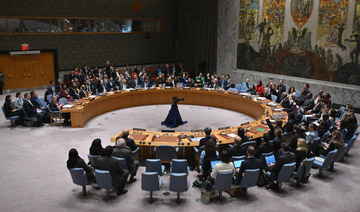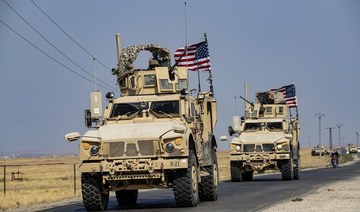AMMAN: Jordan’s Deputy Prime Minister has called on the international community to take a clear stand against hate speech fueling violence and conflict in occupied Palestine.
Ayman Safadi, who is also Jordan’s minister of foreign affairs and expatriates, pointed to the danger of extremist racist ideology, manifested in a “reckless and disgusting manner” in the statement of Israel’s Minister of Finance Betzalel Smotrich.
Jordan’s News Agency reported on Wednesday that the Israeli minister had denied the existence of the Palestinian people and their historical rights, and presented a map of Israel that included the occupied state of Palestine and Jordan.
In a phone call with EU High Representative for Foreign Affairs and Security Policy Josep Borrell, Safadi stressed that Israel’s government should bear the responsibility for “hate speech, racist incitement, and the disgusting behavior of the Israeli minister.”
The government must declare its rejection openly and clearly, he said.
“Staying silent in the face of such statements and racist positions under the pretext of protecting government coalition is unacceptable and dangerous, and will only fan the flames of tension and further spread this extremist ideology.”
Borrell also denounced the Israeli minister’s statements, describing them as “dangerous and unacceptable,” and urged the Israeli government to take a stand.
The EU rejects all unilateral Israeli measures, underscoring its firm position that supports the two-state solution as a way to achieve peace, he added.
The two parties discussed the dangerous deterioration in the occupied Palestinian territories, underlining the need to halt all measures that fuel violence and undermine the chances of a comprehensive peace based on the two-state solution.
Safadi and Borrell also discussed the outcomes of the recent Aqaba and Sharm El-Sheikh meetings on the Palestinian-Israeli conflict, and Jordan’s efforts to help relaunch negotiations to end the violence.
Safadi lauded the EU’s support for the two-state solution and its condemnation of racist hate speech in all its forms.
Jordan urges international community to take a stand against hate speech fueling violence in occupied Palestine
https://arab.news/rsgee
Jordan urges international community to take a stand against hate speech fueling violence in occupied Palestine

- Jordan’s deputy PM points to ‘reckless and disgusting’ comments by Israel’s Finance Minister Betzalel Smotrich
- EU envoy Josep Borrell denounces Israeli minister’s statements, describing them as ‘dangerous and unacceptable’
Muslim-majority allies urge world to up pressure on Israel

- The D-8 Organization for Economic Cooperation called for an immediate ceasefire in the devastated Palestinian territory
- Denouncing an “ongoing genocide and grave violations of international law,” the group called on states to contribute to and join legal proceedings against Israel
ISTANBUL: An alliance of mostly Muslim-majority countries including Turkiye, Egypt and Iran on Saturday demanded full Palestinian membership of the United Nations and greater international pressure on Israel amid the Gaza war.
The D-8 Organization for Economic Cooperation, which also includes Bangladesh, Indonesia, Malaysia, Nigeria and Pakistan, called for an immediate ceasefire in the devastated Palestinian territory, where Israel has been battling Hamas militants for more than eight months.
Foreign ministers from the group meeting in Istanbul called on the United States to lift its veto on full Palestinian UN membership and on all countries to “exert diplomatic, political, economic and legal pressure” on Israel.
They also urged states to ensure Israel complies with the International Court of Justice’s decisions, withdraws from the southern Rafah governorate and guarantees the safe entry of humanitarian aid to Gaza.
Denouncing an “ongoing genocide and grave violations of international law,” the group called on states to contribute to and join legal proceedings against Israel at international courts.
The eight countries also demanded an end to arms and ammunition deliveries to Israel and that all measures be taken to protect Palestinian civilians, rejecting any attempted forced displacement.
They advocated a two-state solution based on 1967 borders with east Jerusalem as a Palestinian capital and a guarantee mechanism to protect a future settlement.
The Gaza war was sparked by Hamas’s unprecedented October 7 attack on southern Israel which resulted in the deaths of 1,194 people, mostly civilians, according to an AFP tally based on Israeli official figures.
Militants from Hamas and other Palestinian armed groups also took 251 hostages, 116 of whom remain in Gaza, including 41 the army says are dead.
Israel’s retaliatory military offensive has killed at least 36,801 people in Gaza, also mostly civilians, according to the Hamas-run territory’s health ministry.
Syria’s forgotten health crisis needs healing: WHO regional chief

- Hanan Balkhy, WHO’s Eastern Mediterranean regional director, said almost half the health workforce had fled the country
- Balkhy said Syria was facing “multi, multi-layered crises,” with 13 years of civil war, sanctions and last year’s major earthquake compounded by a complex geopolitical situation
GENEVA: Syria’s shattered health care system has been forgotten by the world at large, a top WHO official said, urging new, creative thinking to halt the exodus of medical staff abroad.
Hanan Balkhy, the World Health Organization’s Eastern Mediterranean regional director, said young doctors needed to be offered better prospects than practicing fourth-century medicine in dire conditions.
Balkhy, who took office in February, visited Syria from May 11-16, describing the situation on her return as “catastrophic,” with a “staggering” number of people in need and alarming rates of child malnutrition.
She said almost half the health workforce had fled the country.
Balkhy said Syria was facing “multi, multi-layered crises,” with 13 years of civil war, sanctions and last year’s major earthquake compounded by a complex geopolitical situation.
Only 65 percent of hospitals and 62 percent of primary health care centers are fully operational, and they have severe shortages of medicines and equipment.
“We need to think out of the box when it comes to maintaining the health workforce, bringing in younger people, keeping them engaged so that we still have people signing up,” Balkhy told AFP.
Health care workers were facing “very, very low” wages, if they can get a salary.
And if surgeons don’t have an operating room, anaesthetics, professional nurses and sterilization units, “then what’s the use of having a surgeon?,” she argued.
“Then you have to have medications. If you’re not producing your own medications and you could not import your medications, the doctor is paralyzed, in a way.
“So, either you have to accept to practice medicine in the fourth century, where you cauterise people and send them on their merry way, or we try to figure out creative ways.”
Balkhy said such solutions needed to make health professionals more content to stay in Syria or to return to the country, which she said many would “willingly” do, “if they were given some kind of support.”
“They’re learning German in medical school on the side so that they can be ready to jump, and that’s scary for the region,” the Saudi doctor lamented.
She proposed getting young physicians engaged on research projects with a pathway to publishing, so they can “feel that they’re doing something worthwhile” — and making sure that they “at least have the equipment” for surgical operations.
And because doctors cannot travel to conferences to present papers, they need access to virtual platforms to stay in touch with the international health community, she said.
As for medication, Balkhy suggested ramping up pooled procurement and supporting local manufacturing of basic products such as painkillers, antibiotics, and antihypertensives for the “silent killer” — high blood pressure.
Balkhy, who was in Geneva this week for the WHO’s executive board meeting, said the intermittent electricity in Syria had broader knock-on health effects than people might realize.
She said Syria was witnessing a disproportionately high number of burn injuries because people were burning anything — “tires, plastic, fabric” — to cook food and warm their homes, causing domestic fires and respiratory injuries, while regular power cuts were sparking domestic appliances.
“Civilians, children: they’re getting the brunt of it in ways you could never imagine,” said Balkhy.
She urged donor countries to dissociate politics from health and renew their interest in humanitarian funding for Syria.
“I’m a paediatrician by training, so prevention is my game,” she said.
“When you dig deep into the root causes of the harm... much of it is preventable.”
Developing countries call on US to lift Palestinian UN veto

- The Palestinians are currently a non-member observer state, a de facto recognition of statehood that was granted by the UN General Assembly in 2012
ISTANBUL: The D-8 group of developing nations called on Saturday for the US to lift its veto on the full membership of Palestine as an independent and sovereign state in the United Nations.
The Palestinians are currently a non-member observer state, a de facto recognition of statehood that was granted by the UN General Assembly in 2012.
In a declaration after a meeting in Istanbul of its council of ministers, G-8 members Bangladesh, Egypt, Indonesia, Iran, Malaysia, Nigeria, Pakistan and Turkiye also demanded all countries stop supplying weapons and ammunition to Israel.
The UN General Assembly last month backed a Palestinian bid to become a full UN member by recognizing it as qualified to join and recommending the UN Security Council “reconsider the matter favorably.”
The Palestinian push for full UN membership comes several months into a war between Israel and Palestinian militants Hamas in the Gaza Strip, and as Israel is expanding settlements in the occupied West Bank, which the UN considers to be illegal.
As the Palestinian death toll in Gaza has exceeded 36,000 and a humanitarian crisis has engulfed the enclave, human rights groups and other critics have faulted the US for providing weapons to Israel and largely defending Israel’s conduct.
On Saturday, Israeli military said they rescued alive four hostages who were seized by Hamas during the Oct. 7 attack in which Israeli said 1,200 people were killed and 250 abducted.
A Palestinian health official said on Saturday that at least 50 Palestinians were killed in Israeli attacks on Nuseirat and other areas of central Gaza.
Israel hostage families hail rescue of 4 captives as ‘miraculous triumph’

- Israeli army brought home Noa Argamani, Shlomi Ziv, Andrey Kozlov, and Almog Meir Jan
JERUSALEM: An Israeli forum for families of hostages held in Gaza hailed the rescue on Saturday of four captives from the Palestinian territory as a “miraculous triumph.”
“The heroic operation by the (Israeli army) that freed and brought home Noa Argamani, Shlomi Ziv, Andrey Kozlov, and Almog Meir Jan is a miraculous triumph,” the Hostages and Missing Families Forum said in a statement, adding it continued to call on the international community to exert pressure on Hamas to release other hostages.
Car bombing kills two pro-Iran fighters in Syria: monitor

- An explosive device went off in an SUV near the Iranian cultural center
- It was unclear who was behind the attack in Deir Ezzor city
BEIRUT: A car bombing killed two pro-Iran fighters in the eastern Syrian city of Deir Ezzor on Saturday, a war monitor said.
An explosive device went off in an SUV near the Iranian cultural center, killing two Iran-backed fighters, said the Syrian Observatory for Human Rights.
Government forces and Iran-backed groups imposed a security cordon around the site of the attack, said the Observatory, a Britain-based organization with a network of sources on the ground in the war-torn country.
It was unclear who was behind the attack in Deir Ezzor city, a stronghold of Tehran that is home to Iranian advisers, institutions, and the cultural center.
Control of Deir Ezzor province, an oil-rich region bordering Iraq, is split between Kurdish forces to the east of the Euphrates and Iran-backed Syrian government forces and their proxies to the west.
Iran-backed groups including Lebanon’s powerful Hezbollah movement have bolstered President Bashar Assad’s forces since the start of Syria’s civil war in 2011.
The Syrian government’s brutal suppression of a 2011 uprising triggered a conflict that has killed more than half a million people and drawn in foreign armies and militants.






















